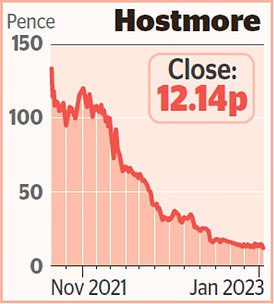MARKET REPORT: Hornby share slump is a red signal for investors
>
Hornby suffered the biggest sell-off among a large number of retailers who alerted the market to holiday trading.
The model train company, which also makes Scalextric cars and Airfix model airplanes, fell 15.5 percent, or 4.5 pence, to 24.5 pence on news it would make a “modest” loss for the year to March.
Sales during the main Christmas trading period between October and December were higher than in the previous 12 months.

Off the rails: Model train company Hornby, which also makes Scalextric cars and Airfix model airplanes, plunged 13.8% on news it would make a ‘modest’ loss for the year to March
And total group revenue to date during the company’s fiscal year was 6 percent higher than the same period in 2021.
But Hornby said sales were still “behind budget” as the deteriorating economic climate took its toll.
The company added that it remained “cautious” on its outlook for the full year and beyond, fearing sales could be squeezed by high inflation and rising mortgage payments for shoppers.
Games Workshop, meanwhile, celebrated the milestone of more than £200 million in sales in its half-year results for the first time.
The Warhammer figurine maker saw its turnover reach £212.3 million in the six months to November 27, compared to £191.5 million a year earlier.
But profits fell 5 percent to £83.6 million over that period. Shares fell 2.5 percent, or 230p, to 8895p.
There was better news for other retailers. Card Factory saw its revenue rise to £432.6m for the 11 months to December, compared to £337.3m in the same period in 2021.
The greeting card seller said profit for the current financial year should be at least £106m compared to market expectations of £96.9m. Shares rose 5.1 percent, or 4.4 pence, to 91.6 pence.
Similarly, online electronics retailer AO World raised its profit forecast to range from £30m to £40m for the year to March after cost cutting.
But the group saw its UK sales fall 17.2 percent in the three months to December compared to the same period a year earlier. Shares fell 5.4 percent, or 3.75 pence, to 65.85 pence.
London’s top tier dipped into the red for the first time this year, with the FTSE 100 down 0.4 percent, or 30.45 points, to 7694.49 and the FTSE 250 up 0.5 percent, or 88.42 points, to 19390 .97.
Investors in mid-cap stocks had little to cheer about.
ITV fell 6.7 per cent, or 5.46 pence, to 76.02 pence on fears the broadcaster behind hit shows such as Love Island, I’m A Celebrity and Coronation Street will struggle to weather an advertising slump.
Morgan Stanley expressed concern that the company “may have performed below advertising guidance for 2022,” while demand for its flagship streaming service ITV X “has declined in recent weeks.”
As a result, the broker lowered its target price on the stock from 47 pence to 44 pence. It was the start of what could be a very difficult week of trading updates within the recruiting industry.
Robert Walters fell 3.3 percent, or 18 pence, to 522 pence after it warned earnings would peak for the year but still fall short of analyst expectations.
The company’s net fee income rose 11 per cent to £105.3 million in the three months to December. But recruiting activity declined during the period, it said.
It led to an industry-wide sell-off, with shares of Hays falling 6.9 percent, or 8.4 pence, to 113 pence, and Page Group falling 7.3 percent, or 34.4 pence, to 439.4 pence.
Shipping broker Clarkson fell 7.9 percent, or 250 pence, to 2,935 pence after HSBC downgraded its rating from “hold” to “buy.” This came less than a week after the company said earnings for the year to December would beat analyst estimates.
An unforgiving start to the year for Frontier Developments was exacerbated after Stifel lowered its target price from 1250 pence to 525 pence.
It comes after the video game maker plunged 43 percent on Monday after issuing a profit warning after a grim Christmas. Shares fell 11.7 percent, or 67 pence, to 506 pence.
Some links in this article may be affiliate links. If you click on it, we may earn a small commission. That helps us fund This Is Money and use it for free. We do not write articles to promote products. We do not allow any commercial relationship to compromise our editorial independence.

